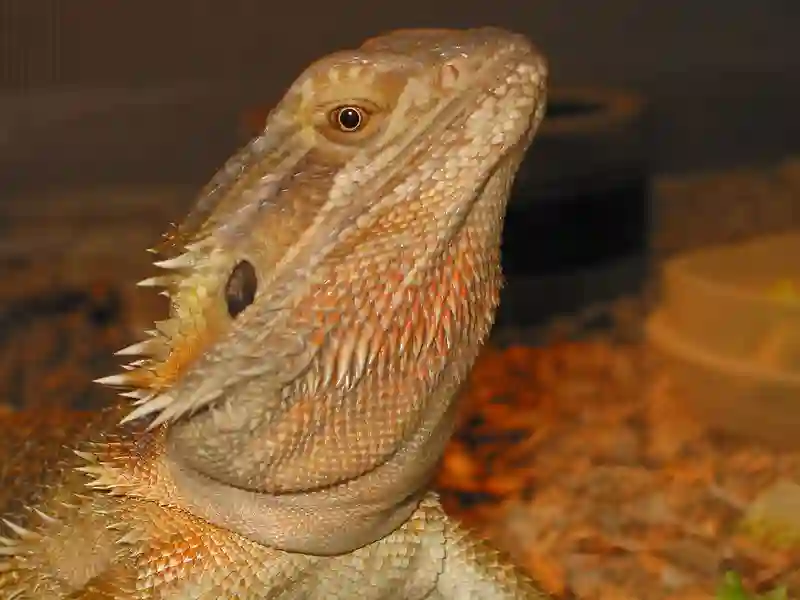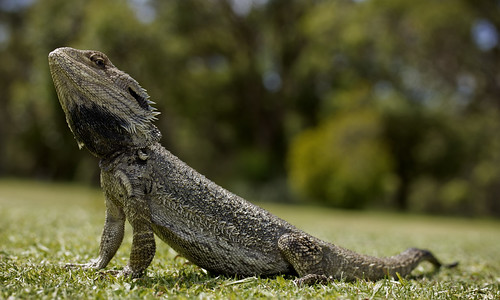This article will discuss the ideal weight range for 6-month-old bearded dragons, factors that can affect a bearded dragon’s weight such as diet, exercise, and health issues; understanding growth rates in bearded dragons; common mistakes owners make with managing their pet’s weight; tips for maintaining your bearded dragon’s proper weight via balanced diet recommendations, exercise routines, and healthy environmental factors.
As an owner it is important to have knowledge about the proper care requirements for these unique pets so you can ensure they live a long and healthy life. The rest of this article will provide you with all the necessary information you need to properly monitor and maintain your bearded dragon’s weight for optimal health.
Ideal Weight for a 6-Month-Old Bearded Dragon
When it comes to determining the ideal weight for a six-month-old bearded dragon, there are a few factors to consider. Generally speaking, these dragons should be growing quickly and developing well at this age.
This means that they should weigh between 250 and 350 grams. However, it is important to remember that every dragon is different, and there may be some variation in what is considered “ideal” depending on factors such as sex, genetics, and overall health.
Average weight range for a 6-month-old bearded dragon
As mentioned above, the average weight range for a six-month-old bearded dragon falls between 250 and 350 grams. However, this is just an average – there may be some variation in what is considered normal or healthy depending on individual circumstances.
Factors that can affect a bearded dragon’s weight
There are several factors that can impact your bearded dragon’s weight over time. Three of the most significant include their diet, exercise habits, and overall health.
Diet
One of the biggest contributors to your bearded dragon’s weight is their diet. These reptiles require a balanced diet that includes both plant matter (such as leafy greens) and protein (such as insects).
If they are not receiving enough of one or both of these components, their growth may slow down or become stunted. On the flip side, if they are being fed too much or given too many high-fat foods (such as waxworms), they may become overweight or obese.
Exercise
Another important factor to consider when it comes to your bearded dragon’s weight is their exercise habits. These creatures are naturally active and curious, and they require plenty of opportunities to move around in order to stay healthy.
Make sure that your dragon has access to a spacious enclosure with plenty of climbing structures and hiding spots. You can also take them out for supervised walks or playtime outside of their enclosure.
Health issues
It is important to be aware that certain health issues can impact your bearded dragon’s weight. For example, parasites, infections, or other illnesses may cause them to lose weight rapidly or struggle with growth and development. If you notice any sudden changes in your dragon’s weight or behavior, it may be a sign that they need veterinary care.
Understanding Bearded Dragon Growth Rates
Bearded dragons are fascinating reptiles that can grow up to 24 inches in length and weigh up to 1 pound. The growth rate of bearded dragons varies based on their diet, environment, and overall health.
Typically, a bearded dragon will grow the most during the first year of its life and will continue to grow until it reaches around three years old. At this point, its growth rate will slow down significantly.
Explanation of Growth Rates in Bearded Dragons
The growth rate of a bearded dragon is influenced by many factors, including genetics, environment, diet and overall health. Young bearded dragons require a lot of energy to sustain their rapid growth rates; therefore they need more food than mature ones.
There is no standard weight for all six-month-old bearded dragons because each can have its own unique growth pace.
How To Track Your Bearded Dragon’s Growth Rate
Keeping track of your bearded dragon’s growth rate is essential for ensuring that you are providing them with the right care and nutrition. You can track their weight using a digital scale or measuring tape for length measurements. It is always good practice to monitor your beardie’s progress regularly by recording each measurement taken.
Comparison to Other Reptiles’ Growth Rates
Beardies may have different growth rates compared to other reptiles such as iguanas or snakes due to their size difference and habitat needs.
Iguanas tend to have slower growth rates than beardies but can also reach larger sizes over time while snakes usually experience faster early-stage-weight-gain due mainly from feeding patterns in captivity but can take longer times before reaching adulthood compared with Beardies which attain maturity at 18 months or less.
Understanding your beardie’s natural development process will help you recognize any growth abnormalities or health issues. It is crucial to provide your pet with a proper diet, environment, and care overall to ensure a healthy and happy life for your bearded dragon.
Common Mistakes Owners Make with Bearded Dragons’ Weight Management
Overfeeding and Underfeeding Risks and Consequences
One of the most common mistakes owners make when it comes to their bearded dragon’s weight is overfeeding. Although it may be tempting to give your pet a little extra food as a treat, overfeeding can lead to obesity and other health problems.
On the other hand, underfeeding can also have negative consequences such as stunted growth, weakened immune system, and poor muscle development.
Incorrect Feeding Habits and Food Choices
Another common mistake is feeding your bearded dragon incorrect foods or in an incorrect feeding method. A healthy diet for a bearded dragon should consist of vegetables, fruits, insects, and occasionally small amounts of meat.
Some owners may believe that feeding their pet dog or cat food is acceptable; however, this is not a proper source of nutrition for a reptile. Feeding inappropriate foods can lead to malnutrition or digestive issues.
Lack of Exercise or Overexertion
Bearded dragons need proper levels of exercise just like any other animal; yet another common mistake that pet owners make with their reptiles is not providing enough opportunities for physical activity which leads to sluggishness and weight gain.
Bearded dragons are active animals by nature so it’s important that they have plenty of space in which they can move about freely while being supervised. On the other end of the spectrum, some owners might take their pets outside for prolonged periods under direct sunlight without shade protection leading them vulnerable to heat stroke.
It’s crucial that you pay attention to the environmental conditions and limit the amount of time they spend outdoors under direct sunlight.
Avoiding these common mistakes can help you maintain your bearded dragon’s weight and overall health. By providing a balanced diet with proper feeding methods, offering ample opportunities for exercise, and monitoring their weight regularly, you can ensure that your pet lives a happy and healthy life.
Tips for Maintaining Your Bearded Dragon’s Weight
Balanced diet recommendations
One of the most important factors in maintaining a healthy weight for your bearded dragon is providing a balanced diet. The main component of their diet should be protein-rich insects such as crickets, mealworms, and dubia roaches.
These should make up around 80% of their diet, with the remaining 20% consisting of fresh fruits and vegetables such as bell peppers, carrots, and squash. It is important to avoid feeding your bearded dragon high-fat or high-sugar foods, as these can contribute to obesity and other health problems.
Exercise routines
Bearded dragons are active creatures that love to climb, explore, and bask in the sun. Providing them with opportunities to do so is crucial for their physical health and mental well-being.
You can encourage exercise by setting up an enclosure that includes plenty of climbing structures and hiding spots. Giving them access to natural sunlight is also important for their health – if this isn’t possible you can use UVB bulbs specifically designed for reptiles.
Healthy environment
Creating a healthy environment for your bearded dragon involves more than just providing proper nutrition and exercise. You need to ensure that the temperature in their enclosure remains consistent throughout the day (between 80-90°F) with a basking spot reaching around 100°F during daylight hours.
At night the temperature can drop slightly but should remain above 70°F (use heating pads if necessary). Proper humidity levels are also essential – aim between 30-40%.
Always provide fresh water regularly – change it at least once daily. By following these tips you will help ensure that your bearded dragon maintains a healthy weight!
Conclusion
After reading this article, you now have a better understanding of how to monitor and maintain the proper weight of your 6-month-old bearded dragon.
It is important to keep a close eye on your pet’s weight, as it can be an indicator of their overall health and well-being. By ensuring they receive a balanced diet, exercise, and a healthy environment, you can help them grow and thrive.
Summary of Key Points
Firstly, it is essential to know the ideal weight range for your 6-month-old bearded dragon. Secondly, monitoring their growth rate will allow you to track their progress accurately.
Thirdly, owners must avoid common mistakes that frequently occur in managing the weight of bearded dragons. Fourthly and most importantly; regular monitoring of your pet’s weight is crucial in maintaining their health.
Importance of Regular Monitoring and Maintaining Proper Weight
As previously mentioned, regular monitoring of your 6-month-old bearded dragon’s weight is extremely important in maintaining their health. Any significant changes in their body mass index should not go ignored as they could indicate underlying health issues or dietary imbalances that may lead to severe complications if left unaddressed.
Final Thoughts on Caring for Your Bearded Dragon
Caring for a bearded dragon can be incredibly rewarding; however, it requires investment of time and effort from any owner that wants healthy pets. Ensuring they receive appropriate food choices from a balanced diet supplemented with proper vitamins and minerals fullfills the nutritional requirements necessary for growth up until adulthood.
A clean living environment with plenty space allows them to engage in interactive activities contributing positively towards fitness levels while keeping them mentally stimulated at all times.



Leave a Reply